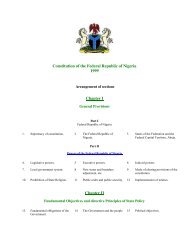Economic Recovery Growth Plan (ERGP) 2017-2020
This Medium Term Plan of the Federal Republic of Nigeria was designed to tackle the huge decline in the country’s economy since her shift from agriculture sector to crude oil and gas sector in the late 1960s. The plan’s objective includes restoring growth, investing in citizens and building a globally competitive economy.
This Medium Term Plan of the Federal Republic of Nigeria was designed to tackle the huge decline in the country’s economy since her shift from agriculture sector to crude oil and gas sector in the late 1960s. The plan’s objective includes restoring growth, investing in citizens and building a globally competitive economy.
You also want an ePaper? Increase the reach of your titles
YUMPU automatically turns print PDFs into web optimized ePapers that Google loves.
Programme<br />
Fiscal stability<br />
No. Strategy Key activities Lead<br />
• Undertake major reforms in the budgeting for<br />
State Owned Enterprises, which will include<br />
legislative amendments of the laws establishing<br />
many of the SOEs. Specifically, Government<br />
will aim to operate a consolidated budget that<br />
will incorporate all agencies that are fully<br />
funded by the Federal Government by 2018.<br />
• Increase the VAT rate for luxury items from 5<br />
to 15 per cent from 2018, while improving CIT<br />
and VAT compliance to raise 350 billion<br />
annually<br />
• Conduct a broad audit campaign to identify<br />
under-filing tax payers<br />
• Improve tax compliance by engaging noncompliant<br />
taxpayers and making them comply<br />
• Formalize businesses in the informal sector<br />
• Encourage whistle-blowing<br />
• Improve customs revenues by reducing leaks<br />
• Accelerate the transformation and<br />
modernization of the Nigerian Custom Service<br />
through a 2-3 year strategic plan<br />
• Deploy technological tools to enhance<br />
collections<br />
• Develop and implement an anti-smuggling<br />
strategy<br />
• Rationalize tariffs and waivers in line with<br />
priority sectors<br />
• Retain sector-based concessions and waivers<br />
and zero per cent duty on the imports of<br />
equipment and machinery required for<br />
strategic sectors<br />
• Review automobile, EEG, mining and hotel<br />
incentives<br />
• Introduce a single window to drive customs<br />
efficiencies<br />
• Implement efficiency programmes for<br />
terminals and cargo clearance (e.g., use lean<br />
techniques to speed up vessel and cargo<br />
handling)<br />
• Increase port efficiency by issuing more<br />
licences to build up terminals in existing ports,<br />
Ministry of Budget<br />
and National<br />
<strong>Plan</strong>ning<br />
Ministry of Justice<br />
Ministry of Industry,<br />
Trade and Investment<br />
Ministry of Transport<br />
44





